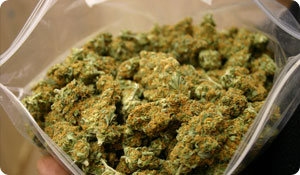
For several decades, researchers have associated pot (marijuana or cannabis) to an increased risk for developing schizophrenia, a severe and disabling brain disorder. Schizophrenic patients hear voices and believe others are broadcasting their thoughts to the world or plotting to harm them. Forty to 50 percent of schizophrenics also have a substance abuse problem.
Medical experts and pot advocates have long debated the validity of this association and the assertion that pot use in adolescence poses a risk for adult psychosis.
Here is summary of the recent debate and the research behind it.
In April 2010, a documentary, Downside of Pot, reported that teens who start smoking pot before age 16 are four times more likely to become schizophrenic. Scientists said young adults who smoke pot nearly doubled their risk of developing recurring psychosis, paranoia, and hallucinations, hallmark symptoms of schizophrenia. Furthermore, they blame this increased risk on today's super potent pot, which contains much higher levels of the psychoactive ingredient THC. At the same time, growers are breeding out cannabidiol, an ingredient in pot that buffers the effect of THC.
Marijuana supporters immediately discredited the studies presented in the documentary.
Also in April, the International Review of Psychiatry published research suggesting that early exposure to pot confers an increased risk for developing schizophrenia, and for individuals with psychotic disorders, pot can exacerbate symptoms, triggering a relapse and worsening the course of the illness. The researchers concluded that pot is likely a contributing factor to, but not necessarily a cause of, schizophrenia.
In May, two new studies contributed additional data to the discussion.
In Schizophrenia Research, researchers concluded that "although cannabis use precedes the onset of illness in most patients, there's no significant association between the onset of [schizophrenia] and cannabis use disorder (CUD) that was not accounted for a by demographic and clinical variables," and they encouraged further research.
In the American Journal of Psychiatry, other scientists reported that 10 years after the first hospitalization for schizophrenia, cannabis use in patients was associated with adverse course of symptoms in schizophrenia and vice versa, even after taking account other clinical, substance abuse, and demographic variables.
Finally, in July, another study published in Schizophrenia Research compared schizophrenic patients with and without CUD and found that those with CUD performed significantly better on measures of processing speed, verbal fluency, verbal learning, and memory. The researchers believe that schizophrenic patients with CUD may represent a higher functioning subgroup of schizophrenics.
Clearly, the debate on the role of pot in developing schizophrenia is far from over.
Sources
Canadian Broadcast Centre."The Downside of High." Web. 11 April 2010.
http://www.cbc.ca/documentaries/natureofthings/2010/downsideofhigh/
Armentano, Paul. "Latest Research On Pot and Schizophrenia Runs Contrary to Mainstream Media Hype." Cannabis Culture Magazine. Web. 28 May 2010.
Sevy S., Robinson D.G., Napolitano B., Patel R.C., Gunduz-Bruce H., Miller R., McCormack J., Lorell B.S., and Kane J. "Are cannabis use disorders associated with an earlier age at onset of psychosis? A study in first episode schizophrenia." Schizophrenia Research. Web. 12 May 2010.
http://www.ncbi.nlm.nih.gov/pubmed/20471224
DeRosse, Pamela, Kaplan, Alyson, Burdick, Katherine, E., Lencz, Todd, and Malhotra, Anil K. "Cannabis use disorders in schizophrenia: Effects on cognition and symptoms." Schizophrenia Research 120 (1-3): 95-100. Web.
References and further reading may be available for this article. To view references and further reading you must purchase this article.
Foti, Daniel J. M.A., Kotov, Roman, Ph.D., Guey, Lin T. Ph.D., and Bromet, Evelyn J. Ph.D. "Cannabis Use and the Course of Schizophrenia: 10-Year Follow-Up After First Hospitalization" American Journal of Psychiatry doi: 10.1176/appi.ajp.2010.09020189. Web. 17 May 2010.
http://ajp.psychiatryonline.org/cgi/content/abstract/appi.ajp.2010.09020189v1
Andreasson, S., Allebeck, P., Engstrom, A., and Rydberg, U. "Cannabis and schizophrenia. A longitudinal
study of Swedish conscripts." Lancet Dec 26;2(8574) (1987):1483-6. Web.
http://www.ncbi.nlm.nih.gov/pubmed/2892048
Arsenaeault, Lousie, Cannon, Mary, Poulton, Richie, Murray, Robin, Caspi, Avshalom, and Moffitt, Terrie E. "Cannabis use in adolescence and risk for adult psychosis: longitudinal prospective study ." BMJ 325 (200): 1212-1213. Web. http://www.bmj.com/cgi/content/full/325/7374/1212?etoc
Blanchard, J.J., Brown, S.A., Horan, W.P., and Sherwood, A.R. "Substance use disorders in schizophrenia: review, integration, and a proposed model." Clinical Psychology Review. 20(2) (2002):207-34. Web. http://www.ncbi.nlm.nih.gov/pubmed/10721498
National Institutes of Health. National Institute of Mental Health. "How is schizophrenia treated?" Web. 7 July 2010.
http://www.nimh.nih.gov/health/publications/schizophrenia/how-is-schizophrenia-treated.shtml





